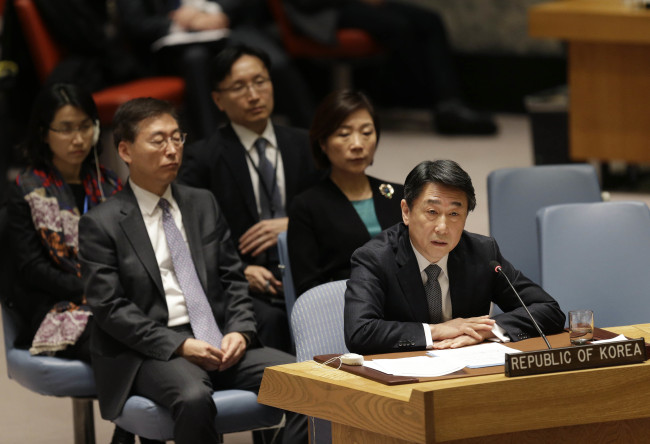Uncertainties remain on volatile peninsula after N.Korea sanctions
By Yoon Min-sikPublished : March 3, 2016 - 18:14
The U.N. Security Council on Wednesday adopted a resolution encompassing what officials have called the “toughest-ever” sanctions on North Korea, but local observers are saying the aftermath of the sanctions and their effect on the communist country’s much-condemned program remain to be seen.
South Korean government on Thursday said that the unanimous adoption of Resolution 2270 represented the will of the international community that the North’s nuclear programs will not be tolerated. The measures were intended as punitive actions against the North’s Jan. 6 nuclear test and Feb. 7 rocket launch.
South Korean government on Thursday said that the unanimous adoption of Resolution 2270 represented the will of the international community that the North’s nuclear programs will not be tolerated. The measures were intended as punitive actions against the North’s Jan. 6 nuclear test and Feb. 7 rocket launch.

On top of the U.N.-led sanctions, Seoul said Thursday that it is reviewing implementation of unilateral sanctions against Pyongyang, believed to include an entry ban on ships that have made port in North Korea. The U.S. has also announced unilateral sanctions against the North that include its powerful National Defense Commission and top aides to its leader Kim Jong-un.
The resolution was adopted after encountering reluctance by China -- Pyongyang’s sole major trading partner -- and Russia, the latter which came just moments before the vote was to be held.
But even after the resolution was adopted, subtle differences were hinted at in the statements from key powers.
Seoul, Washington and Tokyo have stressed full implementation of the sanctions. While Beijing and Moscow have made it clear that the sanctions are necessary, the two countries stressed that it should be a catalyst to getting Pyongyang to participate in the long-stalled six-party talks on the denuclearization of the country.
“The idea is to ensure the return to the table of negotiations for all interested parties,” said Russian Ambassador to the U.N. Vitaly Churkin.
Local experts have raised concerns over the effectiveness of the measures, particularly with China appearing to hold the key to the sanctions. The loose restrictions on cross-border trade between Pyongyang and Beijing have been identified as a possible loophole, especially with China stressing that the sanctions should not hinder the livelihoods of North Korean citizens.
“It basically means that cross-border trade would be allowed. Because from China’s point of view, it is related to profits of Chinese businessmen,” said Koh You-hwan, North Korea studies professor from Dongguk University. “In the long run, what China may be attempting to do is to absorb North Korea into its market, exercising more influence on the peninsula.
Cheong Seong-chang, senior research fellow at the local think tank at Sejong Institute, said that while sanctions would hurt the Kim Jong-un regime, the possibility of regime change is low, as much of the North’s civilian-related financial activities were still allowed.
Cheong also said that China and Russia hold the key to how effective the sanctions will be. He added that the extent to which the two countries will honor the resolution is closely linked to possible deployment of the U.S.’ Terminal High Altitude Area Defense system here.
“China and Russia view THAAD as a more serious threat to their national security than North Korea’s nuclear program. This means if (South Korea and U.S.) decide to station THAAD here, they may effectively refuse to implement the sanctions,” Cheong said.
South Korea’s Defense Ministry has stated that the allies have agreed on the necessity of THAAD, but recent remarks from the U.S. officials have raised possibility that Washington may abort the plans to deploy the system here in exchange for China’s partnership in imposing sanctions against North Korea.
U.S. State Department said Monday that THAAD was not a bargaining chip for sanctions.
“Deploying THAAD here can potentially inflict a huge damage on South Korea, both in terms of diplomacy and finance,” said Cheong, pointing out that Seoul’s largest trading partner is China.
“Rather than to depend entirely on the sanctions, the effects of which can be limited, South Korea should actively push for restart of the six-party talks and further talks between the related parties.”
North Korea may also respond to the U.N. sanctions with military provocations, or as North Korea expert Kim Yong-hyun put them, “armed protests.”
“I say there is a possibility of an armed protest before or after the Key Resolve (joint South Korea-U.S. military drill),” said Kim, a professor of Dongguk University. The joint military drill is slated to commence on Monday.
North Korea on Thursday fired six short-range projectiles into the East Sea in what military officials have suspected was its show of anger over the U.N. resolution. The North’s Foreign Minister Ri Su-yong had said his country would “not be bound” by the sanctions.
Kim said that the North may fire a scud missile -- which is the main threat against South Korea -- into the East Sea, prior to the 7th Congress of the Workers’ Party of Korea scheduled for May.
“It will send a message that it is not fazed by the sanctions, which means the armed protest will be stronger than in the past,” he said.
By Yoon Min-sik
(minsikyoon@heraldcorp.com)










![[Hello India] Hyundai Motor vows to boost 'clean mobility' in India](http://res.heraldm.com/phpwas/restmb_idxmake.php?idx=644&simg=/content/image/2024/04/25/20240425050672_0.jpg&u=)








